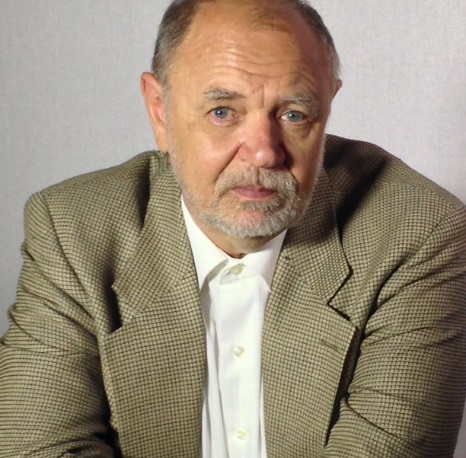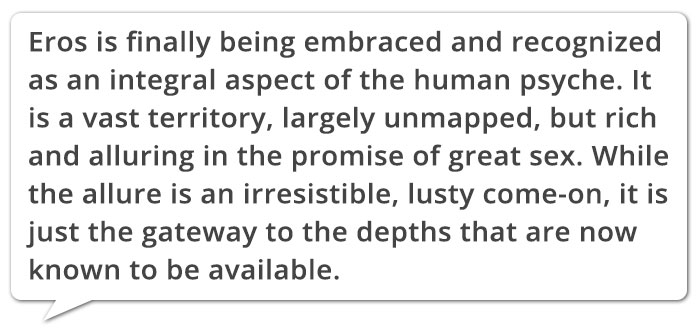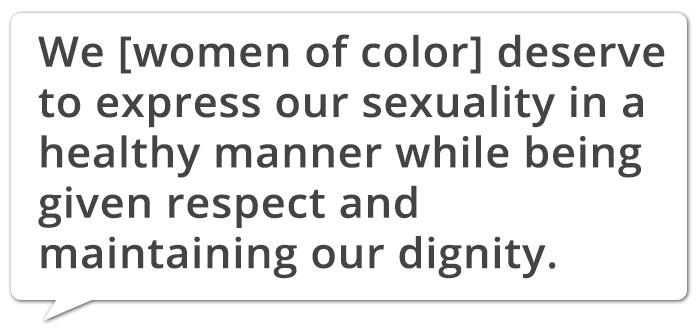You may never imagine how unconscious symbols, fantasies and archetypal personas inhabit and drive your sexual desires until you open your mind to this unique sex positive approach to understanding the many depths of erotic expression. Pychotherapist and fetish sex researcher, Galen Fous, believes we are in a new era of human sexuality in which more people than ever before are discovering their sexual uniqueness in spite of cultural shame. He is weary of a trend in some sex positive circles that values only clinical, so-called objective science of sex, thus dismissing the emotional depths of erotica and fetish. The beautiful metaphors he invokes are worth a read.
1) Identify one or two trends, or influential people in the Sex Positive community that you identify with (or are inspired by) and those trends which you relate to not-so-much.
 After centuries of repression, fear, persecution, misinformation and denial, Eros is showing up all around the world in a way that is unprecedented in the history of civilization. The “normal” range of human sexual expression and desire has shifted profoundly. Millions of people across the globe have already crossed the threshold of previous cultural, moral and spiritual norms for acceptable sexual behavior. Millions more stand at the threshold, eagerly peering in.
After centuries of repression, fear, persecution, misinformation and denial, Eros is showing up all around the world in a way that is unprecedented in the history of civilization. The “normal” range of human sexual expression and desire has shifted profoundly. Millions of people across the globe have already crossed the threshold of previous cultural, moral and spiritual norms for acceptable sexual behavior. Millions more stand at the threshold, eagerly peering in.
New tribes are finding each other to participate in, express and explore every range of kinky perversity imaginable, while others seek to connect with a spiritual path of ecstatic consciousness, centered in a sense of divine regard, achieved by channeling their sexual “energy” through the nervous system.
These early-adapters, and there are tens of millions of you currently, are exploring the wilderness of Eros that has been taboo, forbidden, inappropriate and off-limits to the general population of every age since the rise of “civilization“ and organized religion.
Human sexuality is like a gold mine, buried deep within us, that culture, religion, morality, superstition, law and fear has kept secret. Thanks to the Internet, the secret treasure is gushing out of the depths in a volcanic torrent, stoked by the millions of humans digging for and finding the gold within their Eros.
Eros is finally being embraced and recognized as an integral aspect of the human psyche. It is a vast territory, largely unmapped, but rich and alluring in the promise of great sex. While the allure is an irresistible, lusty come-on, it is just the gateway to the depths that are now known to be available. These new pathways have brought about conscious practices that allow you to be in integrity with your values and agreements while being true and authentic in who you are erotically…no matter how dark or perverse, or as light and spiritual you might seek to be.
This new era of Eros offers us the opportunity to: communicate honestly and openly with our partners about our most taboo desires; safely, authentically express, embody and engage our darkest erotic edges; heal the inevitable psychological wounds of sexual repression and shame our cultures embed in us; learn techniques to be more fully present, aware, embodied, enlivened, connected, intimate, and cultivate Eros as a personally sacred experience; develop tolerance and give support and encouragement to those on other sexual paths; and learn to integrate being liberated sexual creatures into our everyday cultural, family and spiritual life.
In other words, the opportunity to live our lives as if our sexuality is normal!!
There are many other researchers, educators and therapists I would like to mention that promote tolerance and sex-positive views that support each person to find their own shame-free truth, sexual and otherwise. But I will limit it to two here:
Stanley Siegel has devoted over 40 years to sex-positive views as a therapist and author. He has recently started Psychology Tomorrow magazine that offers insights and analysis of many current emerging aspect of sexuality.
Another is personal coach and writer Pamela Madsen, author of Shameless:How I Ditched the Diet, Got Naked, Found True Pleasure…Pamela works primarily with women to resolve deep shame around their bodies and sexuality, and embrace their authentic desire from an empowered place.
A trend I find disturbing is people seeking to find safe ground for the mystery and complexity of their erotic desire within the standard socially acceptable frameworks such as scientific, clinical and evidence based theories. On the whole at this point, these tend to remove or dismiss much too much of our human, emotional, embodied erotic experience. I am concerned people will miss out on the mythic ecstatic depths offered by experiencing their own epic erotic psyches and personas, by only focusing on or acknowledging what can be stated within the parameters of the “science or brain chemistry behind this or that”, or the “evolutionary survival rationale” as the reason for all manner of sexual variation, or a “recent clinical study” shows that…”!
This “Science of Sex” approach, in my judgment, may keep us in a heady, rational experience and removes the mythic potency from the soul of our experience. These approaches mask or discount the depths of emotional intimacy, trust and connection that are occurring, the personally meaningful primal mythic journeys that are taken, and overlooks the profound somatic/ecstatic depths of the human erotic experience.
2) How do you define “sex positivity” for yourself and your work? In other words, what is your primary passion and how do you distinguish your writings and interests from other branches of thought within the sex positive movement?

I feel “sex-positive” means to be supportive and tolerant of sexual diversity and to be committed to discover, embrace, and cultivate one’s own personal sexual identity.
My focus within the sex-positive realm as a psychotherapist and sex-researcher is on what I call Fetishsexuality.
A Fetishsexual is a person driven to orgasm or other deep erotic states through their innate, inherent, life-long desire for a particular range of kink, fetish, Dominance, submission, sadism, masochism or other alternative erotic expressions. Just as gays and lesbians are a distinct sexual identity considered to make up 8-10% of the gene pool (Kinsey, 1948), I believe Fetishsexuals are a distinct sexual identity making up a similar or higher percentage of the gene pool. This is an unverified rough guess extrapolating from my anecdotal review of internet search term data found on sites like porhub.com and similar sources. The PEM survey is a preliminary work that I hope may initiate future scientific studies about Fetishsexuality.
I believe Fetishsexuality operates through both conscious and unconscious aspects of the personal and collective psyche. In this regard, it is my experience that someone with Fetishsexual identity also has what I define as a Personal Erotic Myth (PEM) that is engaged, from within the unconscious, when they become sexually aroused.
A PEM contains the fantasy imagery, storylines, mythic personas, props, attire, dialogue and actions that drive a person who has a PEM to orgasm or other deep erotic states. This mythos is often expressed in Fetish, Kink, and D/s-BDSM oriented sex, where symbol, myth and archetypal personifications abound.
Some people are quite aware of their PEM. For others it is still buried in the unconscious but shows up in private masturbatory reveries or brief moments in the rush right before orgasm, within sexual engagement with a partner. Many may have caught glimpses of their PEM, or more, engaged it secretly, even well before puberty. In a recent survey, I conducted with over 600 anonymous respondents drawn from a sex-positive and alternative population; nearly 60% stated that they had begun having distinct sexual fantasies before 10 years of age. Furthermore, 40% stated they were already masturbating to their fantasies by 10 years of age. Over 70% self-identified as believing that their sexuality was driven by their PEM.
Some may also have multiple PEMs that ebb and flow in their sex life. For many others, it is still an unconscious but compelling force, just below acknowledged awareness, that drives their sexual desire. This is the aspect of their Eros that they may not have looked at nor engaged in consciously; however, during sex, in the moments right before orgasm, their authentic erotic persona, or “sex creature” as I sometimes think of it, can flood into the body in wild, fierce gestures, accompanied by profane, blasphemous invectives—sound-bytes from their PEM.
My ongoing statistical research project on the nature of Fetishsexuality, the “Discover Your Personal Erotic Myth Survey” has broken new ground in developing a theoretical and therapeutic psychological model in this emerging aspect of Eros. This initial glimpse into the nature and depth of peoples’ Fetish, Kink and D/s-BDSM desires, their origins, and what resists their desires has been illuminating. My mission is to expand and deepen this initial research. You can learn more about participating in the completely anonymous online survey here.
From my work with clients and groups over the last 13 years, I have developed The 5 Keys for Fetishsexuals to consciously engage their darkest edge and find fulfillment in sex, life and relationships. These are: Sexual Authenticity, Sexual Honesty, Sexual Empowerment, Sexual Shadow and Paradox. An in-depth definition of these and other aspect of integrating your fetishsexual desires into your everyday life can be found on my site.
3) What directions do you think sex positivity will take within the next 5 – 10 years? Or what topics and with what platforms would you like to see sex positivity develop more thoroughly within the next 5 – 10 years?
I believe the full range of sexuality is heading mainstream. The next few generations will gradually feel the effects of the diminishment of sex-negative attitudes and the expansion of sex-positive attitudes. Hopefully this will make it easier for people to find, embrace and embody their sexual authenticity in a conscious way.
The biggest obstacles will be to shift embedded institutional psychological and moral models of human sexuality. Key areas are in the academic education of undergrad and grad level psychologists and therapists, and in the actual revamping of the psychological and therapeutic models themselves. These are currently well behind the curve of understanding the panorama of sexuality being lived by people in the current era, and will not serve those in the future.
Opinions shared are the author’s own. Want to participate in this interview series? What is your sex positivity?



